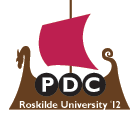| PAPERS | TUESDAY 11:00-12:30 | GRAND AUDITORIUM |
Civic Participation
Session chair: Christian Dindler, Aarhus University
Social media, design and civic engagement by youth: A cultural view
Henry Mainsah, Oslo School of Architecture and Design
Andrew Morrison, Oslo School of Architecture and Design
Abstract. This argumentative essay at the intersection of media studies, Cultural Studies, and literacy research, frames of PD in the emerging territory of social media and civic engagement. We refer to core principles of PD and to recent reflections on social technologies and participation in design. These are linked to research on designing for participative cultural expression via social media. PD is particularly suited to young people’s involvement in the context of design and civic engagement. We argue that a cultural view that highlights issues of power, identity, agency, and culture offers useful avenues for negotiating the interests and perspectives of different stakeholders in civic initiatives. There is a need for design to connect to existing participatory and cultures of youth. We offer illustrations of these and a number of considerations for possible future use.
Designing for all and no one - Practitioners understandings of citizen driven development of public e-services
Katarina L Gidlund, Mid Sweden University
Abstract. The notion of citizen driven development of public e-services has been vivid for a number of years in eGovernment research, practice and policies. There are however, less conceptual analyses resting on a critical stance analyzing how this notion is translated in practical settings, leaving a gap in between for practitioners to solve. This paper presents explorative work made in a Swedish authority by using conceptual disentanglement (as in identifying extensions of the concept, noting regularities and reveal relevant features) as a methodology. The results show that besides difficulties in creating systematic work processes, what surfaces is the complex task of estimation. Estimating who should be participating (when designing for almost all citizens), how many citizens are needed as a base for a design decisions, who decides what should be an objective for a design initiation and on what grounds and legitimacy? The picture evolving is that of an overreliance and an uncritical acceptance of the notion of citizen driven development of public e-services on a policy level, that fails both the practitioners and the citizens; highlighting the need for critical analysis in order to deconstruct the taken for grantedness of the notion of user involvement and deal with the ignorance regarding the details and performance in this specific setting.
Probing, mocking and prototyping: Participatory approaches to identity infrastructuring
Andrew Clement, University of Toronto
Brenda McPhail, University of Toronto
Karen Smith, University of Toronto
Joseph Ferenbok, University of Toronto
Abstract. Since the 1980s, PD has been expanding its scope in terms of scale of information systems as well as diversity of participants, settings and design techniques. A current frontier of PD is infrastructuring, the development of large scale systems that serve a wide range of needs of varied ‘publics’ in an ideally taken-for-granted manner. This paper takes a participatory approach to one prominent area of contemporary infrastructure development, that of jurisdictional identity schemes. Such developments pose significant privacy and security risks. However, for the most part ID scheme expansion is being conducted without the active participation of those most directly affected. We address this concern through a series of action research ‘interventions’ into the development of proposed North American ID schemes. We sought to turn what is often treated as a dry, technical topic into an open, accessible and even fun collective enterprise. Drawing on ‘classic’ PD precepts, such as iteration, realistic use scenarios, ethnographically informed fieldwork, situated reflection, and mock-ups and prototypes, we experimented publically with various artifacts that range from a mock RFID scheme to an Android smartphone digital ID wallet app. Based on this experience, we reflect on lessons for the PD community in terms of how it might approach the growing need for participatory infrastructuring.
